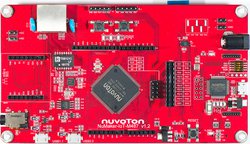Generic Pelion Device Management example for various Nuvoton-based boards.
DEPRECATED
This example application is not maintained and not recommended. It uses an old version of Mbed OS, Pelion DM, and Arm toolchain. It doesn't work with Mbed Studio.
Please use: https://os.mbed.com/teams/mbed-os-examples/code/mbed-os-example-pelion/
This example is known to work great on the following platforms:
- NUMAKER-IOT-M487 over WiFi and using build-in SD
- NUMAKER-PFM-M487 over Ethernet and using build-in SD
- NUMAKER-PFM-NUC472 over Ethernet and using build-in SD
Follow the Quick-Start instructions: https://cloud.mbed.com/quick-start



Example functionality
This example showcases the following device functionality:
- On timer button increment, simulate Pelion LWM2M button resource change
Use this example with Mbed CLI
1. Import the application into your desktop:
mbed import https://os.mbed.com/teams/Nuvoton/code/pelion-example-common cd pelion-example-common
2. Install the CLOUD_SDK_API_KEY
mbed config -G CLOUD_SDK_API_KEY <PELION_DM_API_KEY>
For instructions on how to generate your API key, please see the documentation.
3. Initialize firmware credentials (done once per repository). You can use the following command:
mbed dm init -d "<your company name in Pelion DM>" --model-name "<product model identifier>" -q --force
If above command do not work for your Mbed CLI, please consider upgrading Mbed CLI to version 1.8.x or above.
4. Compile and program:
mbed compile -t <toolchain> -m <TARGET_BOARD>
(supported toolchains : GCC_ARM / ARM / IAR)
5. Copy the binary file pelion-example-common.bin to your mbed device.
Note
This platform and application is suitable for evaluation and initial development. For production purposes, we recommend to use a different variant with built-in security features
drivers/storage/MySystemStorage.cpp
- Committer:
- Sam Chu
- Date:
- 2018-12-18
- Revision:
- 0:e0138281f21d
- Child:
- 2:f07ccb7164d3
File content as of revision 0:e0138281f21d:
/*
* Copyright (c) 2018 ARM Limited. All rights reserved.
* SPDX-License-Identifier: Apache-2.0
* Licensed under the Apache License, Version 2.0 (the License); you may
* not use this file except in compliance with the License.
* You may obtain a copy of the License at
*
* http://www.apache.org/licenses/LICENSE-2.0
*
* Unless required by applicable law or agreed to in writing, software
* distributed under the License is distributed on an AS IS BASIS, WITHOUT
* WARRANTIES OR CONDITIONS OF ANY KIND, either express or implied.
* See the License for the specific language governing permissions and
* limitations under the License.
*/
#include "BlockDevice.h"
#include "FileSystem.h"
#include "FATFileSystem.h"
#include "LittleFileSystem.h"
#if COMPONENT_SPIF
#include "SPIFBlockDevice.h"
#endif
#if COMPONENT_QSPIF
#include "QSPIFBlockDevice.h"
#endif
#if COMPONENT_DATAFLASH
#include "DataFlashBlockDevice.h"
#endif
#if COMPONENT_SD
#include "SDBlockDevice.h"
#endif
#if COMPONENT_FLASHIAP
#include "FlashIAPBlockDevice.h"
#endif
#if COMPONENT_NUSD
#include "NuSDBlockDevice.h"
#endif
using namespace mbed;
// Align a value to a specified size.
// Parameters :
// val - [IN] Value.
// size - [IN] Size.
// Return : Aligned value.
static inline uint32_t align_up(uint32_t val, uint32_t size)
{
return (((val - 1) / size) + 1) * size;
}
BlockDevice *BlockDevice::get_default_instance()
{
#if COMPONENT_SPIF
static SPIFBlockDevice default_bd(
MBED_CONF_SPIF_DRIVER_SPI_MOSI,
MBED_CONF_SPIF_DRIVER_SPI_MISO,
MBED_CONF_SPIF_DRIVER_SPI_CLK,
MBED_CONF_SPIF_DRIVER_SPI_CS,
MBED_CONF_SPIF_DRIVER_SPI_FREQ
);
return &default_bd;
#elif COMPONENT_QSPIF
static QSPIFBlockDevice default_bd(
MBED_CONF_QSPIF_QSPI_IO0,
MBED_CONF_QSPIF_QSPI_IO1,
MBED_CONF_QSPIF_QSPI_IO2,
MBED_CONF_QSPIF_QSPI_IO3,
MBED_CONF_QSPIF_QSPI_SCK,
MBED_CONF_QSPIF_QSPI_CSN,
MBED_CONF_QSPIF_QSPI_POLARITY_MODE,
MBED_CONF_QSPIF_QSPI_FREQ
);
return &default_bd;
#elif COMPONENT_DATAFLASH
static DataFlashBlockDevice default_bd(
MBED_CONF_DATAFLASH_SPI_MOSI,
MBED_CONF_DATAFLASH_SPI_MISO,
MBED_CONF_DATAFLASH_SPI_CLK,
MBED_CONF_DATAFLASH_SPI_CS
);
return &default_bd;
#elif COMPONENT_SD
static SDBlockDevice default_bd(
MBED_CONF_SD_SPI_MOSI,
MBED_CONF_SD_SPI_MISO,
MBED_CONF_SD_SPI_CLK,
MBED_CONF_SD_SPI_CS
);
return &default_bd;
#elif COMPONENT_NUSD
static NuSDBlockDevice default_bd;
return &default_bd;
#elif COMPONENT_FLASHIAP
#if (MBED_CONF_FLASHIAP_BLOCK_DEVICE_SIZE == 0) && (MBED_CONF_FLASHIAP_BLOCK_DEVICE_BASE_ADDRESS == 0xFFFFFFFF)
size_t flash_size;
uint32_t start_address;
uint32_t bottom_address;
FlashIAP flash;
int ret = flash.init();
if (ret != 0) {
return 0;
}
//Find the start of first sector after text area
bottom_address = align_up(FLASHIAP_ROM_END, flash.get_sector_size(FLASHIAP_ROM_END));
start_address = flash.get_flash_start();
flash_size = flash.get_flash_size();
ret = flash.deinit();
static FlashIAPBlockDevice default_bd(bottom_address, start_address + flash_size - bottom_address);
#else
static FlashIAPBlockDevice default_bd;
#endif
return &default_bd;
#else
return NULL;
#endif
}
FileSystem *FileSystem::get_default_instance()
{
#if COMPONENT_SPIF || COMPONENT_QSPIF || COMPONENT_DATAFLASH || COMPONENT_NUSD
static LittleFileSystem flash("flash", BlockDevice::get_default_instance());
flash.set_as_default();
return &flash;
#elif COMPONENT_SD
static FATFileSystem sdcard("sd", BlockDevice::get_default_instance());
sdcard.set_as_default();
return &sdcard;
#elif COMPONENT_FLASHIAP
static LittleFileSystem flash("flash", BlockDevice::get_default_instance());
flash.set_as_default();
return &flash;
#else
return NULL;
#endif
}